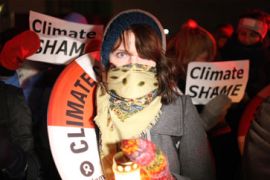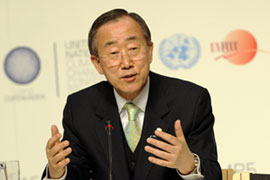Little accord in Copenhagen
Some delegates hail deal as a step forward, but it seems like only a small step.

 |
| Consensus among delegates was rare as the summit drew to a close [AFP] |
With a wish for “happy holidays” and a bang of a gavel, the marathon Copenhagen summit drew to a close.
It had been two years in the planning, there were two weeks of, at times, angry debate, but there was no consensus, only bitterness and anger at the deal done between the US and the world’s emerging economies.
They had talked through the night – discussing the agreement hailed as the ‘Copenhagen Accord’. Exhausted delegates gave emotional speeches, in some cases, diplomatic niceties were set aside.
| in depth |
|
|
Lumumba Di-Aping is the charismatic, some would say abrasive, chairman of the the G77+China group which represents most of the world’s poorer nations.
In the early hours of Saturday, he sparked anger when in his slow and measured tone, he expressed his view: “You cannot ask Africa to sign a suicide pact, an incineration pact in order to maintain the economic dominance of a few countries.
“This is devoid of any sense of responsibility, morality and it is a solution based on the values, the very values which in our opinion channelled six million people in Europe into furnaces.”
The link with the Holocaust was quickly condemned, but later, in the halls of this sprawling centre, one delegate who would never consider himself a friend of the man from Sudan told me quietly: “He was wrong to invoke the comparison, but he’s right. Millions will die because of this decision.”
‘One step forward’
There were those who were prepared to sign up to the principles contained in the deal – even though they were poor on targets, vague on money and barely binding.
Margerehe Segervik from Norway summed up the feeling of many.
“We believe that one step forward is better than two steps back. That’s why we support this document even if it’s not perfect,” she said.
The UN secretary general, the genial Ban Ki-Moon looked exhausted.
He joked he has slept for only two hours in the past 48, hadn’t had dinner and had missed breakfast trying to secure a deal and then talking with delegates.
But for him, this was not a bad deal, but a significant step forward. He told the final session: “I know that most developed and developing countries, they are not all happy but I believe that through this adoption of the Copenhagen Accord you will be able to get everything you need.”
No firm targets
So now it’s part of the climate landscape, people are asking what exactly does the Copenhagen Accord mean?
 |
| Ban Ki-moon said that the accord was a significant step forward [AFP] |
Well it seals a commitment to limit global temperatures rises to no more than two degrees Celcius but crucially sets no firm targets to do that.
It creates a fund of billions of dollars to help poor and vulnerable countries fight climate change and it allows an international exchange of information on carbon emission cuts.
The summit agreed to try to reach a legally binding deal sometime in 2010, but given this difficulties getting this limited deal, that seems more an aspiration than a genuine hope.
The UN’s climate change envoy, Yvo de Boer, who has spent the last twelve days trying to steer negotiations and keep them on track, perhaps summed up the frustration best in a simple sentence.
Looking forward to the next major meeting in this series, Cop16 he said: “I think we’ve got to achieve in Mexico what we failed to achieve here.”
Realistically – this is a step forward.
The steps agreed by some will begin to be introduced early next year – and they believe they will make a difference. But there’s no doubting the sense of frustration and anger because Copenhagen was hailed as a time and place which promised so much and delivered so little.
